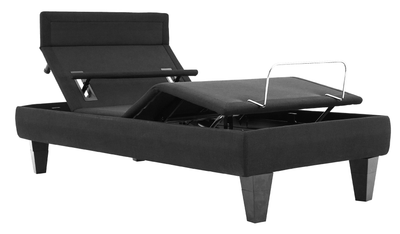How To Choose a Pillow: Things to Consider

The pillow is vital for a restful night's sleep. The right pillow supports your head and neck, promotes proper spinal alignment, reduces discomfort, and improves overall sleep quality. With so many options available, choosing the perfect pillow can be overwhelming.
This blog will help you through the factors to consider when selecting the right pillow that suits your needs and preferences.
What's the Perfect Pillow for You?
The perfect pillow depends on your sleep position, personal preferences, and the level of support your body needs. The goal is to keep your spine in a neutral alignment, so choosing a pillow that complements your sleep style is essential for a comfortable and restful night's sleep.
Best Pillow Based on Sleeping Position
Your sleeping position plays a huge role in determining the best pillow for you. Here's what to look for based on how you sleep:
Back Sleeper
Back sleepers need a pillow that supports the neck's natural curve while preventing the head from being pushed too far forward. A medium-firm pillow with a medium loft is ideal for back sleepers, as it cradles the head while supporting the neck.
Recommended Pillow: Memory foam or latex pillows are excellent for back sleepers as they contour to the neck's shape, providing even support.
Side Sleeper

Side sleepers require a thicker pillow to fill the shoulder and head gap, maintaining proper spine alignment. A high-loft pillow is best for this position to prevent strain on the neck and shoulder.
Recommended Pillow: Firm, high-loft pillows such as memory foam or buckwheat provide ample support for side sleepers.
Stomach Sleeper
Stomach sleepers should choose a soft, low-loft pillow to avoid strain between the neck and back. A thin pillow will help maintain the spine's natural alignment without forcing the head too far back.
Recommended Pillow: Soft, thin pillows like down or a low-loft memory foam pillow are best for stomach sleepers.
Elements in Pillow Choice
Several factors affect the comfort and support of your pillow. Below are the elements to consider when choosing a pillow:
Pillow Shape
While traditional rectangular pillows are the most common, contour or orthopedic pillows are designed to support the head, neck, and spine. Contour pillows, often made from memory foam, are ideal for those who are suffering from neck pain or who prefer extra support.
Pillow Size
Pillow sizes typically correspond to bed sizes, but your preference also matters. Standard pillows are 20" x 26", while king pillows are more prominent at 20" x 36". If you toss and turn at night, a giant pillow might offer more space to rest your head comfortably.
- Standard: Best for single sleepers or smaller beds.
- Queen: Ideal for queen-sized beds and those who move a lot during sleep.
-
King: Offers extra length for larger beds or people who want more pillow surfaces.
Pillow Fill
The material inside the pillow determines its firmness, durability, and support. The most common pillow fills include:
- Memory Foam: It molds to your body, offering personalized support. Ideal for back and side sleepers.
- Down: Soft and lightweight, down pillows provide a plush feel. Great for stomach sleepers but may require frequent fluffing.
- Latex: Naturally hypoallergenic and offers firm, durable support. Perfect for those needing firm support.
- Buckwheat: Filled with buckwheat hulls, these pillows offer firm, adjustable support. It is best for side sleepers or those seeking eco-friendly options.
-
Polyester: Affordable and lightweight but less durable than other materials. Suitable for temporary or guest use.
Firmness Level
Pillow firmness is a personal preference, but choosing a firmness level that provides adequate support based on your sleeping position is essential.
- Soft: Soft pillows are plush and best suited for stomach sleepers or those who prefer minimal neck support.
- Medium: Medium-firm pillows work well for back sleepers, balancing softness and support.
-
Firm: Firm pillows provide solid support and are ideal for side sleepers who need more stability for their neck and shoulders.
Cooling Features
If you tend to sleep hot, look for pillows with cooling features to help regulate your temperature throughout the night.
- Gel-Infused Memory Foam: These pillows have cooling gel layers to prevent heat buildup.
-
Breathable Materials: Latex, bamboo, and cotton are naturally breathable, making them excellent choices for keeping you cool during the night.
When to Replace Your Pillow
Knowing when to replace your pillow is key to maintaining proper support and hygiene. Most pillows should be replaced every 1-2 years, depending on the material and wear.

Signs that it's time to replace your pillow include:
- Loss of Shape: If your pillow no longer maintains its original shape or support, it's time for a new one.
- Allergies or Odors: Pillows can accumulate dust mites, mold, and allergens over time. If your pillow has an unpleasant odor or you're experiencing more allergy symptoms, it may be time for a replacement.
- Neck or Back Pain: If you wake up with neck or back pain that wasn't there before, your pillow may no longer provide adequate support.
Find Your Dream Pillow at Mattress Lux
At Mattress Lux, we understand that the perfect pillow is essential for a restful night’s sleep. That’s why we offer a wide range of pillows designed to suit every sleep style. Whether you're a side, back, or stomach sleeper, you'll find pillows that provide the ideal balance of comfort and support. Choose from premium materials like memory foam, latex, and down, all crafted to ensure proper alignment and ultimate relaxation. Explore our selection today and discover the pillow that’s tailored to meet your specific needs, ensuring you wake up refreshed and rejuvenated every morning.
Conclusion
Pillows are essential for quality sleep, comfort, and proper spinal alignment. Consider your sleep position, the pillow's shape, size, and fill, and know when to replace it. A good pillow can significantly affect how you sleep and feel each morning, so it's worth investing in one that suits your preferences.
FAQs
How Often Should I Wash My Pillow?
It would help to wash your pillow every 3-6 months, depending on its material. Always check the manufacturer's instructions to avoid damaging the pillow.
What's the Best Pillow for Neck Pain?
Memory foam or latex pillows are best for neck pain. It contours to the shape of your neck, offering support and pressure relief.
How Do I Test if a Pillow is Still Good?
Fold your pillow in half and see if it springs back. If it stays folded, it loses its shape and support, indicating it's time for a replacement.







Leave a comment